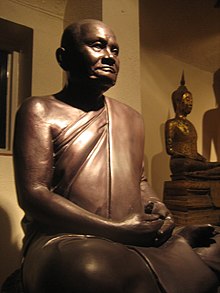Ajahn: Difference between revisions
→Buddhism: Added links Tags: Mobile edit Mobile app edit Android app edit |
Removed obsolete Romanisations. |
||
| Line 2: | Line 2: | ||
[[File:Ajahn Chah (3090908538).jpg|alt=BUDDHIST MONK|thumb|Buddhist monk]] |
[[File:Ajahn Chah (3090908538).jpg|alt=BUDDHIST MONK|thumb|Buddhist monk]] |
||
'''Ajahn''' ({{lang-th|อาจารย์}}, {{RTGS|''achan''}}, {{IPA-th|ʔāː.tɕāːn|IPA}} |
'''Ajahn''' ({{lang-th|อาจารย์}}, {{RTGS|''achan''}}, {{IPA-th|ʔāː.tɕāːn|IPA}} ) is a [[Thai language|Thai-language]] term that translates as "professor" or "teacher". It is derived from the [[Pali]] word ''[[Acariya|ācariya]]'' and is a term of respect, similar in meaning to the Japanese ''[[sensei]]''. It is used as a title of address for high school and university teachers, and for Buddhist monks who have passed ten ''[[vassa]]''. The term "ajahn" is customarily used to address forest-tradition monks and the term [[Luang Por]], "Venerable father", is customarily used to address city-tradition monks in Thai Buddhism. |
||
== Buddhism == |
== Buddhism == |
||
Revision as of 17:48, 22 February 2022

Ajahn (Template:Lang-th, RTGS: achan, IPA: [ʔāː.tɕāːn] ) is a Thai-language term that translates as "professor" or "teacher". It is derived from the Pali word ācariya and is a term of respect, similar in meaning to the Japanese sensei. It is used as a title of address for high school and university teachers, and for Buddhist monks who have passed ten vassa. The term "ajahn" is customarily used to address forest-tradition monks and the term Luang Por, "Venerable father", is customarily used to address city-tradition monks in Thai Buddhism.
Buddhism
According to the Vinaya, any properly ordained monk can become an ācariya after ten vassa in the robes, thus a Thai monk becomes ajahn.
A senior monk may bear the honorific title phra ajahn (Template:Lang-th,"venerable monk"), or in more informal situations, than ajahn (Template:Lang-th,"venerable monk").[1]
Some famous ajahns are:
- Ajahn Amaro
- Ajahn Maha Boowa
- Ajahn Brahm
- Ajahn Chah
- Ajahn Jayasāro
- Ajahn Khemadhammo
- Ajahn Lee
- Ajahn Mun
- Ajahn Pasanno
- Ajahn Sao Kantasilo
- Ajahn Sobin S. Namto
- Ajahn Sucitto
- Ajahn Sumedho
- Ajahn Suwat Suvaco
- Ajahn Thate
- Ajahn Geoff
In Thai, such highly esteemed monks would rarely be called simply ajahn chah, ajahn mun, etc., as there are much more respectful ways for addressing or referring to them.
The term "Ajahn" is generally not formal enough to be used without the prefix "Pra" or "Tan" for monks when addressed by the laity, but this formality has been loosened when it comes to Western monks and Theravada monks well known outside Thailand.
See also
References
- ^ Thanissaro Bhikkhu. "Thai Forest Traditions, Selected Teachers". Retrieved 2011-08-17. The footnote referenced here very usefully elaborates further on various monastic titles using ajahn.
{{cite web}}: CS1 maint: postscript (link)
